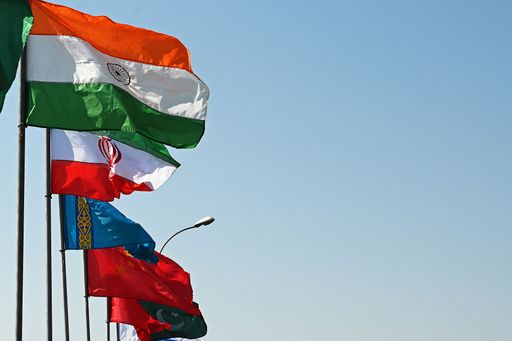Turkish President Recep Tayyip Erdogan will travel to Tianjin, China, from August 31 to September 1 to attend the 25th Heads of State Council meeting of the Shanghai Cooperation Organization (SCO) as a guest of honour, Türkiye’s Communications Director Burhanettin Duran announced on Friday via a post on the Turkish social media platform NSosyal.
The visit marks Erdogan’s first trip to China in five years and comes amid growing strategic ties between Ankara and Beijing. During the summit, Erdogan is scheduled to address an expanded session of the SCO and hold bilateral talks with Chinese President Xi Jinping, as well as other participating leaders.
This year’s SCO summit carries particular weight against the backdrop of global turbulence, as a question mark remains over the Russia-Ukraine ceasefire and the global economy reels from US President Donald Trump’s tariff policies.
“By participating in the SCO Summit, Türkiye aims to assert its presence, strengthen bilateral ties, and engage multilaterally within the framework of the organisation,” said Mehmet Ozkan, Professor of International Relations at the Joint War Institute at Türkiye’s National Defence University.
“Türkiye does not see the SCO as a bloc dominated by any single country,” he told TRT World. “Rather, it sees the organisation as a potential rising multilateral alternative to the Western-dominated international order,” he said.

Natural connection
Türkiye has been a dialogue partner of the SCO since 2012, the first and only NATO country to gain this status, reflecting Ankara’s efforts to balance Western alliances with deeper engagement in Eurasia. The SCO, founded in 2001 by China, Russia, and Central Asian states, focuses on regional security, economic cooperation, and counterterrorism. Full members now include India, Pakistan, Iran, and Belarus.
Under Erdogan, Türkiye has strengthened SCO ties, chairing the SCO Energy Club in 2017 and increasing trade with key members like China and Russia.
“There is a natural connection between Türkiye and the SCO since three of its founding members — Kazakhstan, Kyrgyzstan, and Uzbekistan — are Turkic-speaking,” said former Kyrgyz Prime Minister Djoomart Otorbaev, emphasising Ankara’s constructive position within the bloc.
“President Erdogan’s attendance at the Tianjin Summit will strengthen ties among Turkic nations,” Otorbaev told TRT World from Bishkek. He predicted that Ankara could become a full member in the future.
Last year, Erdogan expressed his desire to make Türkiye a full member of SCO. "Our goal is to become a permanent member. Türkiye should join the 'Shanghai Five' as a permanent member instead of being an observer state,” he had said at a press conference. The SCO evolved from the ‘Shanghai Five’ group established in 1996 by China, Kazakhstan, Kyrgyzstan, Russia, and Tajikistan.
The SCO was originally established to foster cooperation and address regional economic and security challenges among its member states. Over the past 25 years, it has significantly expanded—both in membership and in scope—now encompassing a wide range of issues including trade, technology, environmental protection, renewable energy, sustainable development, as well as cultural and youth exchanges.
Commenting on Türkiye’s role as the only NATO member to be associated with the Eurasian bloc, Otorbaev said: “The SCO is not anti-Western. It is not ‘anti’ anything—it is for friendship and cooperation in Eurasia. All Eurasian countries, including Türkiye, are welcome as members, partners, or observers.”
Ozkan of Türkiye’s National Defence University explained that Ankara has two main aims at the SCO Summit in Tianjin. “First, it wants to demonstrate a non-Western orientation in its foreign policy and deepen relations with the countries represented in the SCO,” he said.
“Second, it will likely raise the issue of Gaza, at least in private discussions. It may also share perspectives on Ukraine or engage in sideline meetings that could set the stage for future leadership-level dialogue,” Ozkan said.

Bilateral ties on positive trajectory
Beyond the multilateral forum, Erdogan’s visit underscores Ankara’s deepening bilateral ties with Beijing. “Relations between Türkiye and China are already on a positive trajectory, and holding this meeting in China will likely contribute further to that momentum,” Özkan observed.
Henry Huiyao Wang, founder and president of the Center for China and Globalization (CCG) and former State Council Councillor, similarly praised Türkiye’s role in promoting global peace.
“Türkiye, as both a NATO member and an SCO observer state, shares a strong partnership with China in advancing peace,” Wang told TRT World, noting Ankara’s mediation in the Black Sea grain corridor and ongoing efforts in Russia-Ukraine peace talks and Middle East conflict resolution.
Wang highlighted Erdogan’s calls for UN reforms, describing them as complementary to China’s vision for a more inclusive global order. “The Global South should have a stronger voice, and the current structure should better reflect the influence of emerging economies,” Wang said, emphasising the need for multilateral cooperation to address global crises.
Ozkan said the essence of Türkiye’s Eurasia policy is “connecting but not depending,” noting that Ankara seeks ties with both the West and the non-West nations while avoiding reliance on any single power. “That’s why Türkiye identifies as part of the West, but at the same time as part of the non-West and the Global South,” he explained.
Erdogan’s attendance at the 2025 SCO summit comes as the bloc celebrates its 25th anniversary and amid geopolitical turbulence. Analysts noted that Türkiye’s dual role—as a NATO member and a dialogue partner in a Eurasian initiative—positions it uniquely as a bridge between East and West.



















